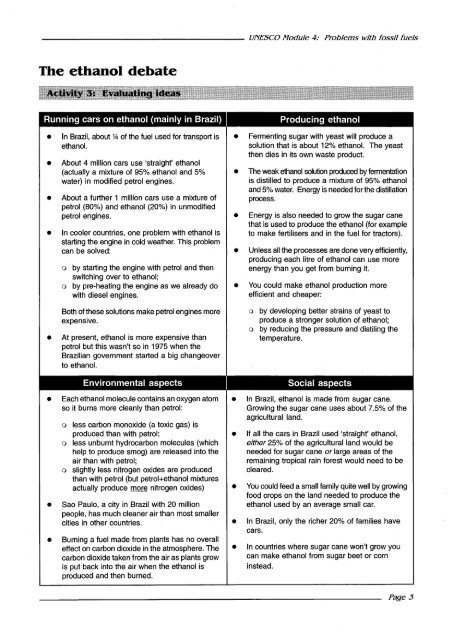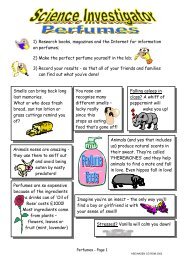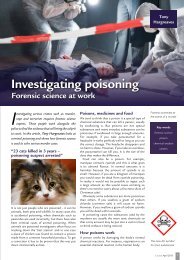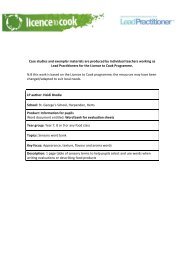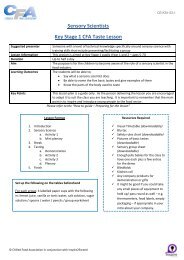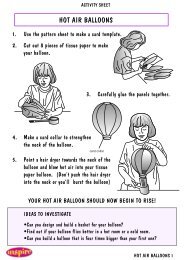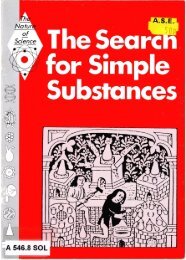UNESCO resource kit - science and technology educa...
UNESCO resource kit - science and technology educa...
UNESCO resource kit - science and technology educa...
You also want an ePaper? Increase the reach of your titles
YUMPU automatically turns print PDFs into web optimized ePapers that Google loves.
The ethanol debate<br />
<strong>UNESCO</strong> Module 4: Problems with fossil fuels<br />
Running cars on ethanol (mainly in Brazil) Producing ethanol<br />
• In Brazil, about % of the fuel used for transport is ethanol.<br />
• Fermenting sugar with yeast will produce a<br />
solution that is about 12% ethanol. The yeast<br />
• About 4 million cars use 'straight' ethanol<br />
(actually a mixture of 95% ethanol <strong>and</strong> 5%<br />
water) in modified petrol engines.<br />
then dies in its own waste product.<br />
• The weak ethanol solution produced by fermentation<br />
is distilled to produce a mixture of 950/0ethanol<br />
•<br />
<strong>and</strong> 5% water. Energy is needed for the distillation<br />
About a further 1 million cars use a mixture of petrol (80%) <strong>and</strong> ethanol (200/0) in unmodified<br />
petrol engines.<br />
•<br />
process.<br />
• Energy is also needed to grow the sugar cane<br />
that is used to produce the ethanol (for example<br />
In cooler countries, one problem with ethanol is starting the engine in cold weather. This problem<br />
can be solved:<br />
to make fertilisers <strong>and</strong> in the fuel for tractors).<br />
• Unless all the processes are done very efficiently,<br />
producing each litre of ethanol can use more<br />
0 by starting the engine with petrol <strong>and</strong> then energy than you get from burning it.<br />
switching over to ethanol;<br />
0 by pre-heating the engine as we already do<br />
with diesel engines.<br />
• You could make ethanol production more<br />
efficient <strong>and</strong> cheaper:<br />
•<br />
Both of these solutions make petrol engines more 0 by developing better strains of yeast to<br />
expensive. produce a stronger solution of ethanol;<br />
At present, ethanol is more expensive than<br />
0 by reducing the pressure <strong>and</strong> distiling the<br />
temperature.<br />
petrol but this wasn't so in 1975 when the<br />
Brazilian government<br />
to ethanol.<br />
started a big changeover<br />
Environmental aspects I Social aspects<br />
• Each ethanol molecule contains an oxygen atom<br />
so it burns more cleanly than petrol:<br />
o less carbon monoxide (a toxic gas) is<br />
produced than with petrol;<br />
o less unburnt hydrocarbon molecules (which<br />
help to produce smog) are released into the<br />
air than with petrol;<br />
o slightly less nitrogen oxides are produced<br />
than with petrol (but petrol-ethanol mixtures<br />
actually produce more nitrogen oxides)<br />
• Sao Paulo, a city in Brazil with 20 million<br />
people, has much cleaner air than most smaller<br />
cities in other countries.<br />
• Burning a fuel made from plants has no overall<br />
effect on carbon dioxide in the atmosphere. The<br />
carbon dioxide taken from the air as plants grow<br />
is put back into the air when the ethanol is<br />
produced <strong>and</strong> then burned.<br />
• In Brazil, ethanol is made from sugar cane.<br />
Growing the sugar cane uses about 7.50/0of the<br />
agricultural l<strong>and</strong>.<br />
• If all the cars in Brazil used 'straight' ethanol,<br />
either 25% of the agricultural l<strong>and</strong> would be<br />
needed for sugar cane or large areas of the<br />
remaining tropical rain forest would need to be<br />
cleared.<br />
• You could feed a small family quite well by growing<br />
food crops on the l<strong>and</strong> needed to produce the<br />
ethanol used by an average small car.<br />
• In Brazil, only the richer 200/0of families have<br />
cars.<br />
• In countries where sugar cane won't grow you<br />
can make ethanol from sugar beet or corn<br />
instead.<br />
PageS


